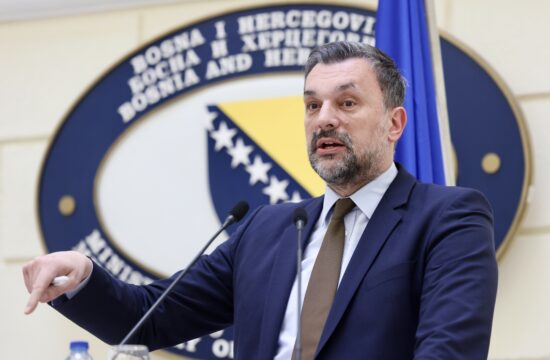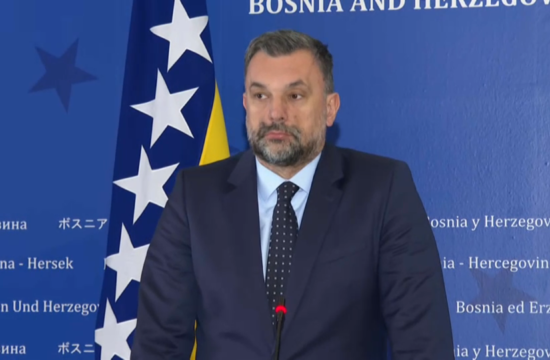
Almost two months after Kosovo and Serbia signed their economic normalization agreement, echoes of the much-touted “historic deal” have faded. Almost no one mentions it anymore, and everyday Balkan political life has turned to new topics. So, will the spirit of the agreement be maintained? And what is its importance to the dialogue between Belgrade and Pristina? Indeed, what is its weight, if any?
Edward P. Joseph, interviewed by Indira Ćatić, spoke to the Atlantic Initiative on these issues. Joseph teaches at Johns Hopkins University and served for over a dozen years in the Balkans, including as Deputy Head of the OSCE Mission in Kosovo, as well as in wartime Bosnia-Herzegovina, Kosovo, and North Macedonia.
Additionally, Joseph has experience leading non-profits, as a foreign policy analyst, and as a field practitioner specializing in conflict management. He has been published in virtually all major outlets, including Foreign Affairs, from which his article, “The Balkans, Interrupted” was selected as one of “The Best of 2015.” Previously the Executive Directorate of the Institute of Current World Affairs in Washington, DC, Joseph is currently Executive Director of the National Council on US-Libya Relations.
He earned his J.D. at the University of Virginia School of Law, and his B.A. and M.A., respectively, from Johns Hopkins University and its School of Advanced International Studies, where he now teaches. Trained as a helicopter pilot in the US Army Reserve, Joseph is a veteran who was deployed with NATO in Bosnia and Herzegovina.
Atlantic Initiative: “How Donald Trump lost the Balkans” written for Foreign Policy states that the diplomacy conducted under the motto “we do not see evil”, conducted by the US administration of Donald Trump in the Western Balkans, has produced a dangerous turn of events in the region. What are the consequences of this kind of geopolitical experiment in the shaky Western Balkans, but also for the long-term strategic interests of the United States? How much is the Trump administration aware of these consequences?
Edward P. Joseph: In my Foreign Policy article last week, I explained concretely how this Administration's wholesale focus on economic experiments and disdain for political engagement has seen a serious deterioration in/between six countries: Serbia; Kosovo; Montenegro; North Macedonia; Bulgaria; and BiH. The immediate consequences are further deterioration in relations and increased risks of conflict. The Trump Administration is so intent on declaring its Serbia-Kosovo diplomacy at the White House a ‘success’, that it refuses to call out Serbia on egregious behaviour.
Relations are worse, not better, between Serbia and Kosovo since the September ‘deal.’ Likewise, with the courting of Bulgaria all while Sofia mounts these high-handed pressures on Skopje over identity issues. Like James Baker's infamous statement (‘We don't have a dog in that fight’), the Trump Administration is signaling a laissez-faire attitude. Is it any wonder that two days after Bulgaria received more praise for its commitment to the NATO alliance from Washington that the Bulgarian Defense Minister Karakachanov threatened to use military force on another NATO ally, North Macedonia? This is a serious abdication of responsibility by the Trump Administration.
Russia is only too happy to see dissension among NATO allies, and tensions rise between Serbia and Kosovo — not to mention a pro-Russian, pro-Serbian, anti-NATO government (by its background) as well as tensions in Bosnia. No, I don't believe the Trump Administration is aware of the consequences — and no one should be surprised by that. Trump's entire ethos is to proclaim success — including most seriously in the pandemic — without a basis for it.
Atlantic Initiative: In September, US President Donald Trump hosted Serbian President Aleksandar Vučić and Kosovar Prime Minister Avdullah Hoti at the White House to sign an economic normalization agreement that will lead to the establishment of air, rail, and motorway links between Belgrade and Pristina. President Trump, who also signed the document during the White House ceremony, called the agreement “historic.” From your point of view, what is the importance of this agreement? What does it mean practically for Kosovo and Serbia, and for neighbouring countries?
Edward P. Joseph: First, let’s look at the region. With so many people, including young people, leaving the Balkans, it’s critical to develop the economy and create jobs. I also believe that resolving the open political questions – questions that have been open for more than two decades – is central to developing the economy. Kosovo is seriously hampered by the fact that it is not fully recognized. Serbia is also hampered by the unresolved Kosovo issue, unable to truly move on past the legacy of the 1990s.
This problem is long-overdue for resolution. I don’t believe it’s a good idea to keep postponing it or, as the Trump Administration has done, avoiding it.
Second, the theory is that these Washington commitments on the economy would ease the way for political compromise. Just in September, there was all this hype and celebration in both Belgrade and Pristina. And what has actually happened between Belgrade and Pristina? In the wake of the Trump Administration’s diplomacy we’ve seen some of the worst rhetoric since the early post-war period. I don’t need to repeat what was said by the Serbian Defense Minister in the headline of an official Defense Ministry communication. I don’t need to repeat the sinister remark of the Serbian Foreign Minister, precisely on the issue of missing persons, which is the first issue to be discussed in the dialogue. These are disgraceful remarks. And they are not outliers; there is a context here and it is completely contrary to the one painted by the Trump Administration about a “historical breakthrough.” It looks more like a “breakdown” and indeed, the Brussels talks have broken down.
Third, I don’t think it’s right to only criticize what others attempt to do, unless you are prepared to offer a solution. I have done that, right on the eve of the White House talks last month. My article in Foreign Policy sets out a complete proposal for resolving the Kosovo dispute – in a way that protects the core interests of both sides. It is grounded in reality: the fact that the Russian (and Chinese) veto over Kosovo in the Security Council enables Serbia to avoid a serious, level negotiation with Kosovo. It is based on getting Kosovo into NATO, which would, in turn, liberate Serbia from having to divide Kosovo. Instead, a level playing field would be created for Serbia – assisted by the US and EU – to finally focus on securing the status of Serbs throughout Kosovo, instead of trying to divide the country. It is a realistic approach because the US, Spain, Slovakia, Romania, Greece, and the rest of the EU share common concerns. The US and EU can address these concerns. And both Kosovo and Serbia – and the rest of the region, including Bosnia, can finally move forward.
Atlantic Initiative: After meeting in Washington, Hoti and Vučić held talks in Brussels, where the EU has been mediating between Kosovo and Serbia for over a decade. According to some analysts, the EU is not taking the White House agreement seriously. Could the document help the EU achieve better results? Brussels has insisted on new dynamics and on reaching a final agreement on the normalization of relations within “a few months, not years.” Is that realistic?
Edward P. Joseph: As for the EU-led talks themselves, they have for the moment broken down over the issue of the Association/Community of Serb Municipalities. In any negotiation, it’s critical to avoid a breakdown – for example, where one side insists on speaking about an issue and the other side refuses. That’s achieved by having an agreed sequence to discuss the issues. After all, in most negotiations, including this one, not all issues are equally difficult or contentious. Missing persons was a good starting issue because there are Serbs and Albanians who are missing; both sides have an interest in getting this resolved. I don’t know what happened here: whether there was an agreed sequence of issues or not.
As for the possibility of the EU achieving mutual recognition (or what it calls, ‘normalization’), I’m having difficulty seeing how the current approach leads to that all-important goal.
That’s why I provided my alternative. Atlantic Initiative: Some have commented that the Trump Administration’s primary goal was public spectacle, rather than a workable agreement that achieves the normalization of relations between Kosovo and Serbia. At this point, where does the story of formal recognition of Kosovo stand? Joseph: Same answer. I have difficulty seeing the path to achieving that. That’s why I published my alternative proposal in Foreign Policy last month.
Atlantic Initiative: How do you view the cooperation between Washington and Brussels on the issue of Serbia-Kosovo relations?
Edward P. Joseph: This negotiation over Kosovo is difficult enough without the additional complexity of the Trump Administration in some kind of competition with the EU. It’s not a question of a ‘document’, which is a list of parallel statements or commitments, it’s a question of a coherent Trans-Atlantic strategy.
The EU has just released its own 9 billion euro Economic and Investment Plan. How much overlap is there? What elements could have been refined and improved had Washington been collaborating with Brussels instead of in some bizarre competition?
Atlantic Initiative: What about Israel? Does this herald changes and new relations in the Middle East? Washington announced the Serbia-Kosovo normalization agreement only 22 days after it announced the groundbreaking Israel-UAE normalization agreement, and an Israel-Bahrain normalization agreement was announced shortly after the Serbia-Kosovo news. Belgrade and Pristina have both vowed to establish relationships with Israel. Also, Pristina’s will be the first embassy of a Muslim-majority state in Israel.
Edward P. Joseph: The real question here is not what happens in the Middle East. Neither Serbia nor Kosovo are players in the Middle East, even with the declared placement of their respective embassies in Jerusalem. The question is how does the Israel element advance relations between Serbia and Kosovo? Many people have called for Israel to recognize Kosovo, and now it appears to be happening, and vice-versa. We have to see what any of that means for the dispute between Belgrade and Pristina.
Atlantic Initiative: The agreement appears to provide President Trump with a diplomatic victory ahead of the November presidential election. Can we expect a sense of continuity in US policy towards the Balkans?
Edward P. Joseph: As I pointed out, the “historical breakthrough” has been followed by a breakdown: the talks between Serbia and Kosovo are blocked; the rhetoric between Belgrade and Pristina is toxic; and the commitments are vague and largely unrealized. Look at what Belgrade has said about the commitment to not use “untrustworthy vendors” for 5G. President Vučić and Prime Minister Brnabić have refused to spurn the Chinese. We have heard denials about what this commitment means. We need a fresh start in the US, in the Balkans, in Europe, and in the world, with new leadership.
Atlantic Initiative: Finally, in November, Bosnia and Herzegovina will mark the anniversary of signing the Dayton Peace Agreement. After 25 years, how much progress have we made?
Edward P. Joseph: It is not possible to use the word ‘progress’ and ‘Bosnia and Herzegovina’ in the same sentence, and still be serious. The stagnation has gone on so long, it is perilous.




